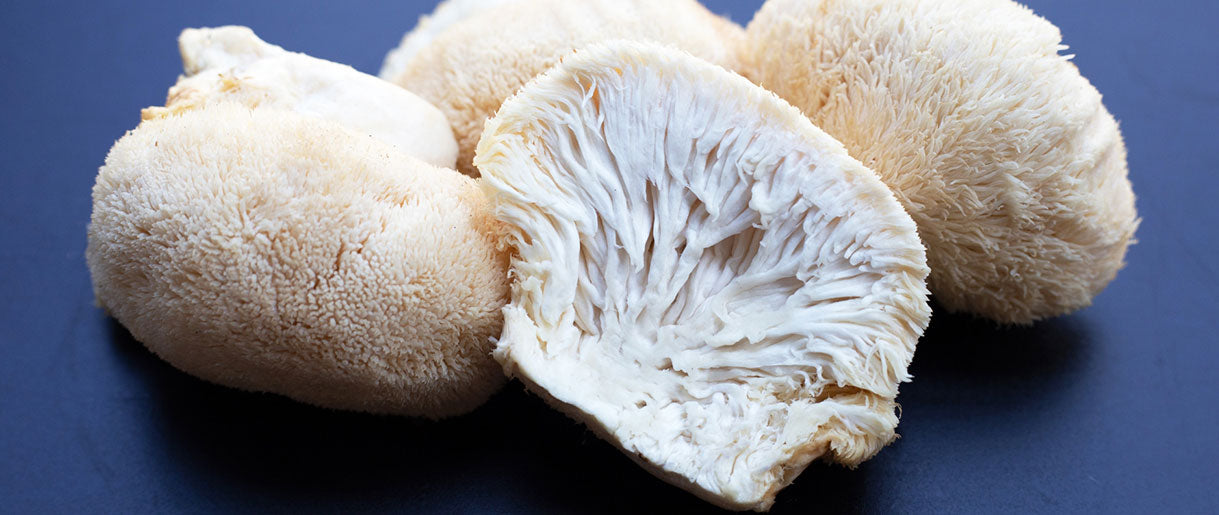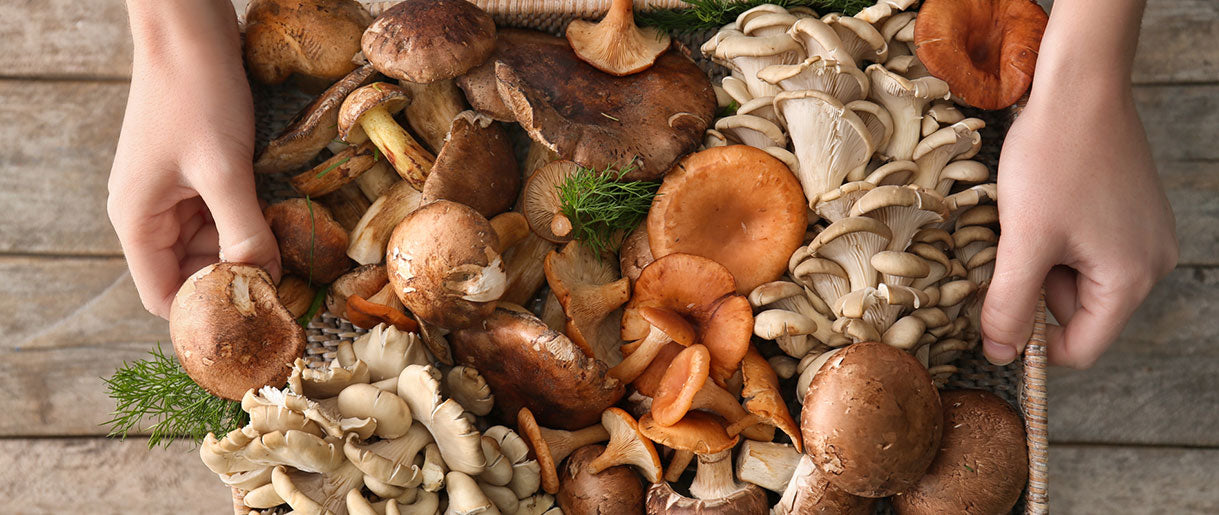Mushrooms have long fascinated scientists and food enthusiasts alike for their unique flavors and potential ergothioneine benefits. Among the many compounds found in mushrooms, one particular element has been gaining attention for its promising health-promoting properties - ergothioneine. In this article, we'll delve into the world of ergothioneine mushrooms, exploring what makes them special and how they can contribute to overall well-being.
What is Ergothioneine?

Ergothioneine(1) is a naturally occurring amino acid and a powerful antioxidant that plays a vital role in protecting our cells from oxidative stress. It was first discovered in 1909 when it was isolated from ergot fungi, from which its name is derived. Since then, researchers have been increasingly fascinated by its unique properties and potential health benefits.
Chemically, ergothioneine is classified as a sulfur-containing amino acid. This unique sulfur-based structure allows ergothioneine to scavenge free radicals effectively, neutralizing them before they can cause harm to our cells.
Ergothioneine is primarily found in certain fungi, bacteria, and plant species. Among them, mushrooms are the most abundant natural source of this beneficial amino acid. Various mushroom species synthesize and accumulate ergothioneine to varying degrees.
Some of the ergothioneine-rich mushrooms include Shiitake (Lentinula edodes), King Trumpet (Pleurotus eryngii), Maitake (Grifola frondosa), and Porcini (Boletus edulis) mushrooms. These mushrooms have been prized not only for their taste but also for their potential health benefits due to their high ergothioneine content.
Besides mushrooms, ergothioneine can also be found in certain other foods, albeit in smaller amounts. Some examples of foods containing ergothioneine are kidney beans, black beans, oat bran, garlic, and some animal-based products like liver and kidney. However, mushrooms remain the most significant dietary source of this essential compound.
The Role of Ergothioneine in Health

Research suggests that ergothioneine offers numerous health benefits due to its potent antioxidant properties(2). As an antioxidant, it helps protect our cells from oxidative stress, which occurs when there is an imbalance between free radicals and antioxidants in our bodies. Oxidative stress can lead to cellular damage and is associated with various chronic health conditions.
Antioxidant Properties and Cellular Protection
Ergothioneine acts as a scavenger of free radicals, neutralizing them before they can cause damage to our cells. By doing so, it helps prevent oxidative damage to cellular components like lipids, proteins, and DNA. This protection is vital for maintaining the overall health and function of our cells and tissues.
Chronic inflammation is linked to several health issues, including heart disease, diabetes, and certain cancers. Ergothioneine's antioxidant properties may help reduce inflammation and mitigate the risk of these conditions.
Neuroprotection
Studies have shown that ergothioneine can cross the blood-brain barrier, indicating its potential role in supporting brain health. It has been associated with neuroprotective effects, potentially reducing the risk of neurodegenerative disorders like Alzheimer's and Parkinson's disease.
Aging
Oxidative stress contributes to the aging process, leading to cellular damage and tissue deterioration. Ergothioneine's ability to combat oxidative stress may help slow down the aging process and support healthy aging.
Ergothioneine-Rich Mushrooms

If you're looking to incorporate ergothioneine into your diet, you need to know which mushrooms contain eergothioneine. The ergothioneine content in mushrooms can vary depending on factors such as species, growing conditions, and preparation methods.
For example, wild mushrooms may have higher ergothioneine levels than cultivated ones, and cooking can affect the concentration of this valuable compound. Several mushroom species(3) are known for their high ergothioneine content. Among them, the following varieties stand out:
Shiitake Mushrooms
Shiitake mushrooms are not only popular for their delicious umami flavor but also for their significant ergothioneine content. They are widely available and can be a great addition to various dishes.
King Trumpet Mushrooms
Also known as king oyster mushrooms, this variety is another rich source of ergothioneine. They have a meaty texture, making them a suitable substitute for meat in certain dishes.
Maitake Mushrooms
Maitake mushrooms, often referred to as "Hen of the Woods," are highly valued in traditional medicine and are known for their health-promoting properties, including their ergothioneine content.
Porcini Mushrooms
Porcini mushrooms have a robust flavor and are prized in culinary circles. They also boast a considerable amount of ergothioneine, making them a flavorful and nutritious choice.
Antioxidant Synergy in Mushrooms

Mushrooms are not only rich in ergothioneine but also contain an array of other antioxidants that work together in harmony. This synergy of antioxidants creates a powerful defense against oxidative stress and contributes to their overall efficacy in promoting health.
Antioxidants are molecules that neutralize free radicals, which are unstable molecules produced during metabolic processes or in response to external factors like pollution, smoking, and UV radiation. If left unchecked, free radicals can cause cellular damage, leading to various health issues and accelerating the aging process.
Antioxidants work by donating an electron to stabilize free radicals, effectively rendering them harmless. However, during this process, antioxidants themselves become unstable. Here's where the concept of synergy comes into play.
In mushrooms, different antioxidants(4) complement each other, enabling them to regenerate and stabilize one another. This creates a beneficial cycle, enhancing the overall efficacy of these antioxidants and prolonging their protective effects.
Benefits of Antioxidant Synergy

The combined action of various antioxidants in mushrooms results in several benefits for human health:
- Enhanced Protection– The synergy between antioxidants ensures a continuous supply of active molecules, extending their protective effects against oxidative damage.
- Reduced Oxidative Stress– Oxidative stress is minimized as different antioxidants target a wide range of free radicals and prevent their harmful effects on cellular components.
- Combatting Inflammation– By neutralizing free radicals, the antioxidant synergy in mushrooms may help reduce inflammation, thereby contributing to the prevention of chronic inflammatory diseases.
- Promoting Longevity– The ability to counter oxidative stress and cellular damage is linked to the slowing down of the aging process and supporting healthy aging.
FAQs about Ergothioneine Mushrooms
Can Ergothioneine Mushrooms help with specific health conditions?
While more research is needed to establish definitive conclusions, the antioxidant properties of ergothioneine mushrooms suggest potential benefits in combating inflammation, supporting brain health, and potentially slowing the aging process.
How do Ergothioneine Mushrooms differ from regular mushrooms?
Ergothioneine mushrooms are varieties that contain higher levels of ergothioneine compared to regular mushrooms. This elevated ergothioneine content sets them apart and makes them more sought after for their potential health benefits.
How can I incorporate Ergothioneine Mushrooms into my diet?
You can easily add ergothioneine-rich mushrooms like shiitake, king trumpet, maitake, and porcini to your diet. They can be included in various recipes, such as stir-fries, soups, omelets, or grilled as a side dish. Their unique flavors and potential health benefits make them an excellent choice for mushroom enthusiasts and health-conscious individuals alike.
Key Takeaway
In conclusion, ergothioneine mushrooms have captivated the interest of researchers and health enthusiasts due to their powerful antioxidant properties and potential health benefits.
By incorporating these mushrooms into your diet, you can enjoy not only their delicious flavors but also the potential contributions they make to your overall well-being.
References
- Mushrooms: A rich source of the antioxidants ergothioneine and glutathione, (1)https://pubmed.ncbi.nlm.nih.gov/28530594/
- Quantification of polyphenols and ergothioneine in cultivated mushrooms and correlation to total antioxidant capacity, (2)https://www.sciencedirect.com/science/article/abs/pii/S0308814607000659
- EC NUTRITION EC NUTRITION Research Article Antioxidant and Ergothioneine Assessment of Nutritionally Enriched Agaricus bisporus Powders, (3)https://www.researchgate.net/publication/359210133
- Ergothioneine; antioxidant potential, physiological function and role in disease, (4)https://pubmed.ncbi.nlm.nih.gov/22001064/









Let Us Know Your Comments